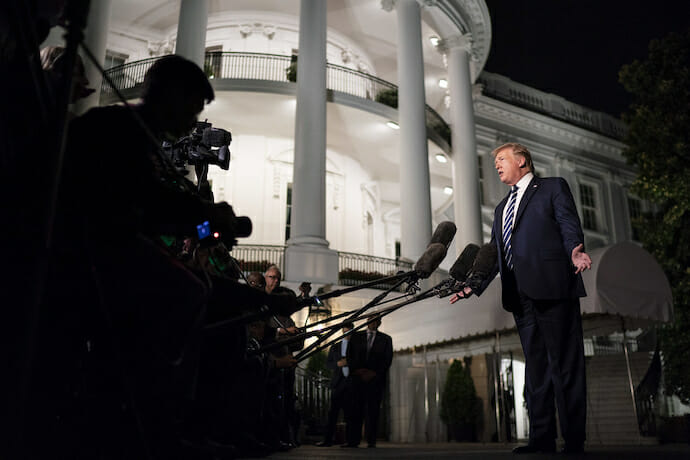
Hong Kong, Trade, and Trump’s Losing Bet
With the crisis in Hong Kong gaining greater attention in the U.S., and the U.S.-China trade war no nearer a resolution, President Donald Trump took to linking the two issues to coerce China into making a trade deal with the United States. However, by connecting his floundering trade war to the ongoing protests in Hong Kong, the president has shown that his administration continues to fundamentally misunderstand how to deal with China. The topic of Hong Kong is a nonstarter for Beijing, and by linking it to any potential trade deal, Trump has threatened Hong Kong’s stability and U.S.-China relations. In misreading Beijing, Trump has wagered a losing bet.
Before he even took office, president-elect Trump angered Beijing by speaking with the president of Taiwan, breaking over forty years of U.S. protocol and showing the diplomatic world his incomprehension of the intricacies of relations with China. Nearly three years later the Trump administration continues to demonstrate its lack of nuance in interacting with China in its attempt to attach Beijing’s response to the Hong Kong protests to the negotiation of a bilateral trade agreement.
For China, the “one country, two systems” principle, as well as all issues of sovereignty, be it Taiwan or the South China Sea, are non-negotiable topics. Beijing’s ability to protect and look after its territorial and sovereignty claims, and maintain stability is at the core of the CCP’s credibility with the Chinese people. As long as Trump continues to link any such issue with the trade war, it makes it virtually impossible for Beijing to negotiate any deal with the U.S. The CCP cannot back down on matters of territorial sovereignty, as doing so would make the Beijing government look weak in the eyes of the Chinese, diminishing its standing and hold on power.
Conversely, the growing support for the people of Hong Kong in Washington will make it difficult for President Trump to detach his comments linking a trade deal with the protests. In doubling down the trade war along with crisis in Hong Kong, Trump placed a bet that he could speed up trade negotiations with China by threatening Beijing that if it does not respond to the Hong Kong crisis in a peaceful and appropriate manner, then the U.S. would find it quite difficult to hash out a deal with China.
This was Trump’s great miscalculation. While his administration may have thought that by doubling down on these issues it could score two big diplomatic victories, it overlooked what is most important to Beijing.
The status of Hong Kong’s autonomy and Beijing’s control over the Special Administrative Region supersedes any trade deal with the U.S. and is of greater priority to the CCP. Xi Jinping’s government cannot back down from any foreign infringement on Hong Kong or any of its territorial claims, without the threat of losing credibility with the Chinese people. When paired with Trump’s trade demands, Xi and Beijing will always place its credibility and authority first.

While President Trump is right to condemn any violent or military intervention in Hong Kong, and the right to support the people of Hong Kong in defending the autonomy of its judiciary, legislature and economic liberties laid out in the Hong Kong Policy Act, linking China’s handling of the protests concerning these issues to trade is not a winning strategy.
Xi and Beijing will not capitulate sovereignty issues for a trade deal. China is prepared to dig-in for the trade war if given no other option from Washington. Beijing views the current status of trade and relations with the U.S. as temporary – in either two or six years Trump will leave the White House, and Beijing can then work with a new U.S. president and administration on mending and restoring trade ties.
Until that time, China has worked to lessen its economic dependence on the United States, opening markets around the world through its One Belt One Road initiatives, spreading the ‘Made-in-China’ brand beyond the U.S., as well as developing an internal consumer economy. And while the U.S. is by far China’s largest trade partner, it does not depend on the U.S. economy quite as much as it did even ten years ago.
Further pressuring China over the Hong Kong crisis to coax a quicker end to the trade impasse may only lead to dire consequences. If the Trump administration does not realize how important and sensitive such sovereignty issues are to Beijing and miscalculates how far the mainland may be willing to impose its will on Hong Kong, the results could be devastating.
Chinese intervention in Hong Kong would have a global impact. Multinational firms there have tripled since the British handover in 1997, and China’s relations with the world would deteriorate, likely leading to sanctions, the exit of multinational corporations, and untold damage to Beijing’s global credibility.
Any unrest in Hong Kong poses a major challenge for the president. He faces growing scrutiny as his 2020 reelection bid looms, and an increasingly uncompromising and confrontational approach with China will only make a trade agreement more unlikely. It is no easy balancing act supporting Hong Kong’s liberties without Beijing accusing the U.S. of meddling in China’s domestic affairs. Trump is only making matters worse for himself and the crisis in doubling down trade with the Hong Kong situation.
For the benefit of both issues, it would be wise for President Trump to reverse course on the connection he placed on the two problems. Trump has made a habit of walking back statements and decisions he has made throughout his presidency, and this is a prime situation that would benefit from a change of heart. Trump needs to separate Hong Kong from trade with China and focus on preserving stability and peace in Hong Kong while respecting China’s internal affairs. However, there is no doubt Trump should still push for China to respect the liberties Hong Kong retains from the mainland. While no simple task, there is too much at stake for all parties to continue shortsighted antagonizing positions.
Threatening Beijing with trade does not help the two countries come to an agreement. Hong Kong is not a bargaining chip for any deal-making, just as Taiwan and the South China Sea are not. Trump has attempted to use them before, further highlighting just how his administration fails to grasp relations with China.
Trump faces losing both the trade war with China and the peace and stability of Hong Kong. The U.S. needs Hong Kong not only for its significance as a regional trade and business leader but also as a conduit into relations with China. Given this administration’s history of misapprehending its relations with Beijing, such an invaluable asset cannot be lost over an unnecessary confrontation just to bring China to the trade bargaining table – that is far too big a gamble for the people of Hong Kong and the world economy to lose.

